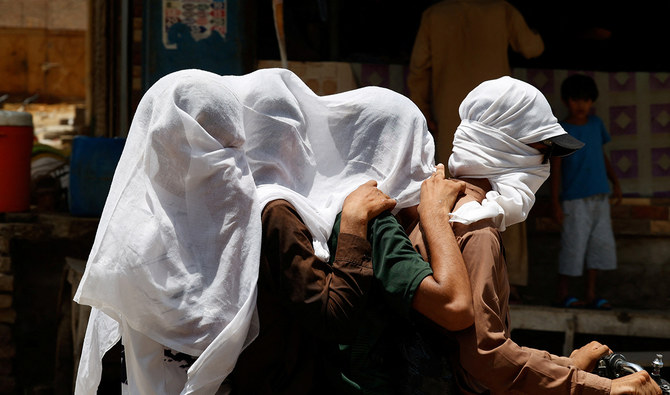ISLAMABAD: A spokesman for the Punjab Disaster Management Authority has said temperatures will continue to rise in southern parts of the Punjab province from today, Monday, amid an ongoing heat wave that is expected to carry on until next month.
Pakistan’s disaster management authority warned earlier this month temperatures in certain areas of Pakistan’s southern Sindh and eastern Punjab provinces could surge to 40 degrees Celsius between May 15-30. The Provincial Disaster Management Authority (PDMA) warned of an “intense” heat wave in the southern districts of Punjab, with severe risk identified in Bahawalpur, Rahim Yar Khan, Dera Ghazi Khan and Multan districts from May 21 to May 27.
An estimated 18 million students are also unable to attend classes because Punjab, Pakistan’s populous province Punjab, has ordered shutting down schools this month due to rising temperatures.
“Mercury will rise further in Bahawalpur, Rahim Yar Khan, Bahawalnagar, Dera Ghazi Khan and Multan districts from today, Monday,” a Punjab official was quoted as saying by state broadcaster Radio Pakistan on Monday.
“The National Institute of Health has advised people to avoid unnecessary outings and drink more water to prevent themselves from the effects of heatwave.”
Addressing a press conference last week, the Prime Minister’s Coordinator on Climate Change Romina Khurshid Alam said 26 districts of the country were in the grips of a heat wave since May 21.
Alam said the first wave would last till May 30, the second would begin from June 7-8 and the third one in the last week of June. May and June were recorded as the “hottest and driest” with higher monthly average temperatures, she added, appealing to the masses, especially children and elderly, to adopt preventive measures.
She noted that the severity of heat waves had increased rapidly during the past few months with 13 districts of Sindh, nine of Punjab and four districts of Balochistan experiencing “severe heat.”
“Harsh weather is likely to persist at least till June 3. There is no possibility for respite, at least for Sindh. The heat spell may break in parts of Punjab but that, too, after June 4,” the chief meteorologist said last week.
Increased exposure to heat, and more heat waves, have been identified as one of the key impacts of climate change in Pakistan, with people experiencing extreme heat and seeing some of the highest temperatures in the world in recent years. The South Asian country of more than 241 million, one of the ten most vulnerable nations to climate change impacts, has also recently witnessed untimely downpours, flash floods and droughts.
Climate change-induced extreme heat can cause illnesses such as heat cramps, heat exhaustion, heatstroke, and hyperthermia. It can make certain chronic conditions worse, including cardiovascular, respiratory, and cerebrovascular disease and diabetes-related conditions, and can also result in acute incidents, such as hospitalizations due to strokes or renal disease.
According to the Global Climate Risk Index, nearly 10,000 Pakistanis have died while the country has suffered economic losses worth $3.8 billion due to climate change impacts between 1999 and 2018. A deadly heat wave that hit Pakistan’s largest city of Karachi, the capital of Sindh, claimed 120 lives in 2015.
In 2022, torrential monsoon rains triggered the most devastating floods in Pakistan’s history, killing around 1,700 people and affecting over 33 million, a staggering number close to the population of Canada. Millions of homes, tens of thousands of schools and thousands of kilometers of roads and railways are yet to be rebuilt.
















